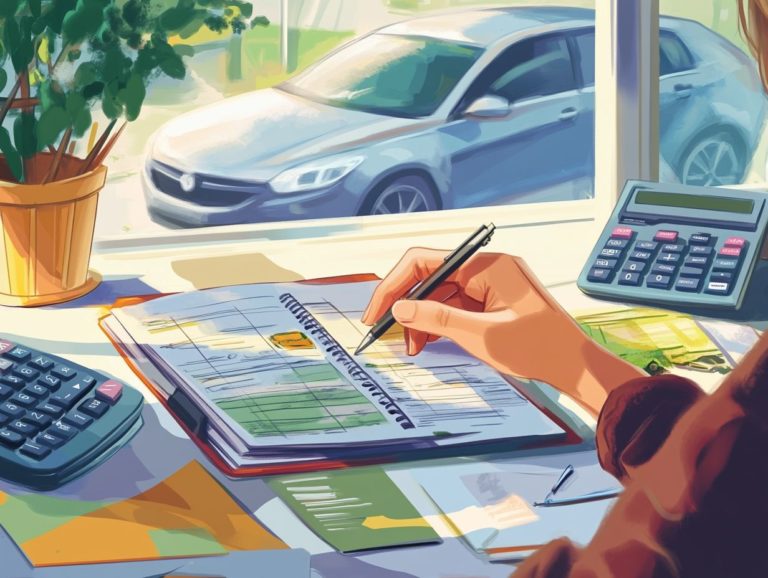How to Ensure a Smooth New Car Purchase
Buying a new car can be thrilling yet overwhelming.
With so many options available, it’s essential to have a clear strategy. Identify your needs, set a realistic budget, explore financing options, and learn how to negotiate.
This guide will help you through every step of the process. You ll learn how to finalize your purchase and drive away with confidence!
Contents
- Key Takeaways:
- Researching and Planning for Your Purchase
- Financing Your New Car
- Negotiating the Best Deal
- Finalizing the Purchase
- Frequently Asked Questions
- 1. What should I do before heading to the dealership to ensure a smooth new car purchase?
- 2. Should I get pre-approved for a car loan before visiting the dealership?
- 3. What should I keep in mind when test driving a car?
- 4. How do I negotiate the price of a new car?
- 5. Are there any additional fees I should be aware of when purchasing a new car?
- 6. Can I trade in my old car for a new one?
Key Takeaways:

- Think about your needs and budget before researching car models to make a smart purchase.
- Learn about financing options and interest rates to avoid financial stress.
- Negotiate the price carefully to ensure you get the best deal on your new car.
Researching and Planning for Your Purchase
Researching your car purchase is vital. It can save you both time and money.
Start by evaluating what you need in a vehicle and setting a budget. This groundwork, along with negotiation tips for buying a new car, allows you to navigate the car-buying process confidently.
Be sure to research different models. Focus on factors like fuel economy and maintenance costs.
Understand your financial standing, including credit scores and upfront payment options. This information will help you make informed choices.
Identifying Your Needs and Budget
Knowing what you need and establishing a budget are key steps in your car-buying journey.
Consider the size and type of vehicle that fits your lifestyle. Do you need a compact car for city driving, a family SUV for trips, or a rugged truck for adventures?
Think about features that improve safety and comfort, like advanced driver-assistance systems and infotainment options. This will help you narrow down your choices.
Also, factor in your credit score when planning for down payments and monthly payments. This way, your choice aligns with your needs and financial capacity.
Researching Car Models and Features
Investigating different car models is crucial to finding the right vehicle for you.
Look at features that matter to you, such as infotainment systems, safety features, and space. Fuel economy is important too, as it affects your savings and environmental impact.
Use resources like Kelley Blue Book and TrueCar for insights and pricing. These tools will help you evaluate options effectively.
Financing Your New Car
Understanding car loans and interest rates is essential when financing your new car.
Explore different loan terms offered by credit unions and banks to find the best fit for your needs.
Exploring Financing Options

Exploring various financing options is essential for securing the best deal on your car loan while ensuring it aligns with your financial capacity.
By considering avenues such as traditional bank loans, credit unions, and dealership financing, you can discover solutions tailored to your unique situation. Bank loans often present competitive interest rates but may require checking your credit history. On the other hand, credit unions typically offer lower rates and more personalized service, although eligibility can sometimes be a bit restrictive. Dealership financing might be convenient, yet it often comes with higher rates or less favorable terms.
You must evaluate the advantages and drawbacks of each option. This evaluation will help you make an informed choice that enhances your financial situation and ultimately leads to a more satisfying car buying experience. Explore your options today!
Understanding Interest Rates and Loan Terms
Understanding interest rates and loan terms is essential when navigating your car loan options, as these factors can significantly impact your overall financial commitment.
These rates are shaped by various elements, including the state of the economy, your credit score, and the duration of the loan agreement. Essentially, higher interest rates will elevate your monthly payments, making you spend more over time. Conversely, opting for shorter loan terms may lead to heftier monthly installments but can ultimately save you money on interest down the line.
Therefore, it s crucial for you to evaluate both the interest rate and loan term when financing a vehicle. Making informed choices can pave the way for better financial outcomes and a budget that feels much more manageable.
Negotiating the Best Deal
Negotiating the best deal demands strategic preparation and a comprehensive grasp of the car-buying process. For first-time new car buyers, engaging with a reputable dealership can truly transform your experience and outcomes.
Tips for Negotiating the Price
When you negotiate the price of your new car, being well-informed about the market value is essential to securing the best deal possible. This insight enables you to approach the negotiation table with confidence, giving you a clear understanding of what constitutes a fair price.
To maximize your effectiveness, conducting thorough market research beforehand can offer invaluable insights into comparable models, regional price variations, and the dealer’s inventory. Knowing how to spot a good new car deal is crucial, and it’s important to be prepared to walk away if the terms don’t align with your expectations; your readiness to do so can often prompt the dealer to present a more attractive offer.
Effective negotiation is a delicate balance of strategy and assertiveness, allowing you to advocate for your best interests without compromising too much on your needs. With the right knowledge, you hold the power in your hands!
Considerations for Trade-Ins and Add-Ons
Considering trade-ins and add-ons during your negotiations can truly enhance your leverage and elevate the value of your car purchase.
As you approach the trade-in process, accurately assessing your current vehicle’s worth is crucial. Utilize reliable online tools to research its market value; this knowledge equips you with valuable insights that can significantly impact negotiations.
When discussing potential add-ons, take a moment to differentiate between features that genuinely enhance your driving experience and those that are simply enticing distractions. Don t underestimate the importance of warranties; comprehensive coverage can protect you from unexpected repair costs, while flexible financing options can make your purchase more manageable.
Ultimately, being a well-informed buyer who negotiates thoughtfully positions you to fully capitalize on the benefits, especially if you understand the new car buying process, enhancing your overall satisfaction with your new vehicle.
Finalizing the Purchase

Finalizing the purchase of your new car entails a meticulous series of steps, including knowing how to prepare for a new car purchase, each crucial to ensuring a smooth transition.
You’ll want to review the contract carefully, paying close attention to the details, and take the time to understand the warranty terms that will protect your investment for the long haul. This could save you a lot!
Reviewing the Contract and Warranty
Reviewing the contract and warranty terms closely is crucial to ensure that every detail related to your new car purchase is accurately documented, especially when considering how to prepare for a car purchase negotiation.
This step requires your attention, especially regarding maintenance responsibilities. These detail the obligations of both you and the manufacturer in terms of vehicle care and upkeep. Understanding the specifics of coverage what’s included and what s explicitly excluded can help you avoid unexpected costs down the line.
It’s essential to clarify the duration of coverage and any limitations that could impact future claims. By taking the time to carefully check these elements, you enable yourself to make informed decisions, safeguard your investment, and steer clear of potential pitfalls from overlooked clauses.
Making the Payment and Taking Delivery
Making the payment and taking delivery of your new car is the final step in your car-buying journey, transforming you from a prospective buyer into a proud owner.
You can usually choose from several payment methods, such as bank transfers, dealership financing options, or personal checks. Each method has unique advantages tailored to your financial situation.
Once you finalize the payment, the next phase involves arranging for delivery. You can choose to pick it up at the dealership or opt for auto transport services for the convenience of home delivery.
Be sure to discuss the details of delivery with the dealership, including timelines and any potential extra costs. This ensures a smooth transition into car ownership and helps you understand what to expect when buying a new car, allowing you to fully savor the experience.
Frequently Asked Questions
Here are some common questions buyers have before purchasing a new car:
1. What should I do before heading to the dealership to ensure a smooth new car purchase?
Before going to the dealership, it is important to research and compare prices, read reviews, and determine your budget. Additionally, understanding how to finance a new car purchase will help you make an informed decision and avoid surprises during the purchase process.
2. Should I get pre-approved for a car loan before visiting the dealership?

Yes, getting pre-approved for a car loan will give you a better understanding of your budget and can also help speed up the purchasing process. It also gives you more negotiating power when it comes to the interest rate.
3. What should I keep in mind when test driving a car?
When test driving a car, take your time to thoroughly inspect the vehicle. Check for any unusual noises, ensure all features and functions work properly, and pay attention to how the car handles on different roads.
4. How do I negotiate the price of a new car?
To negotiate the price of a new car, research beforehand and use this information to your advantage. Be confident and assertive, but also be willing to walk away if the dealership is not willing to meet your desired price.
5. Are there any additional fees I should be aware of when purchasing a new car?
Yes, there may be additional fees such as destination charges, documentation fees, and sales tax. It is important to ask the dealership about these fees upfront and factor them into your budget.
6. Can I trade in my old car for a new one?
Yes, you can trade in your old car for a new one. Make sure to research the value of your old car beforehand and negotiate its trade-in value separately from the new car purchase. You can also consider selling your old car privately for potentially more money.
Ready to take the plunge? Visit your nearest dealership today!






